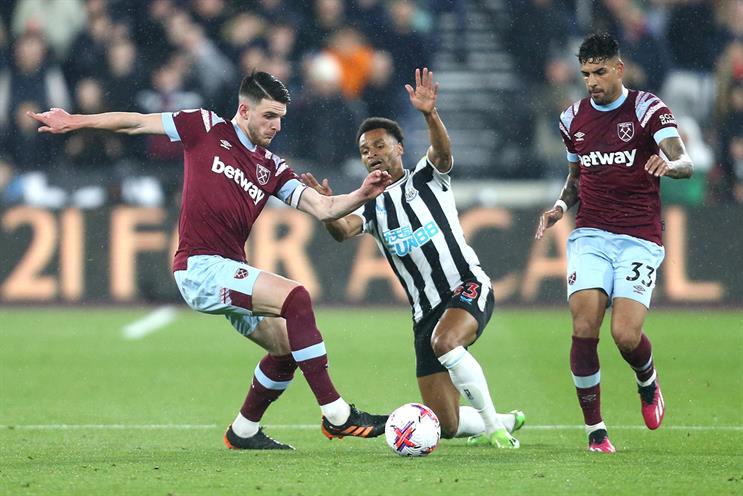Premier League clubs have agreed to voluntarily phase out gambling sponsors from the front of matchday shirts from the end of the 2025/26 season.
Eight Premier League clubs currently have betting sponsors on the front of matchday shirts, collectively worth £60m. These include Newcastle, Everton, Leeds and West Ham.
The decision does not address gambling advertising on pitchside hoardings or from betting firms backing clubs through other sponsorship slots, such as placing logos on the sleeves of shirts and training gear.
The collective decision by clubs to remove gambling brands from jerseys follows a consultation with the Premier League and the Department for Culture, Media and Sport, which is part of a government review into gambling legislation and marketing.
The Premier League is the first UK sports league to mandate against gambling sponsorship.
Gambling brands are the most prevalent front-of-shirt sponsors in football and the second-most common, after automotive, across football, cricket, rugby union and rugby league.
Last year, the Premier League began a consultation with clubs to ascertain whether they would voluntarily phase out betting sponsors from the front of shirts, which is considered a premier sponsorship slot.
Henry Chappell, the founder and chief executive of Pitch Marketing Group said he “universally agrees” that phasing out gambling sponsorship is the right decision and overdue.
“Having gambling brands on shirts and for kids to see that association so overtly and prominently is counter to the culture and expectation of restrictions for advertising of gambling sector elsewhere,” he told Campaign.
“It’s a belated step in the right direction and probably the right amount of restriction imposed on gambling brands.”
The reason why the issue has taken years to resolve, argues Chappell, is due to the politics of how the Premier League is governed with each club registering a vote in decisions. Smaller clubs rely more heavily on gambling sponsorship revenue than larger counterparts like Liverpool, Manchester United and Chelsea.
An example of this is Nottingham Forest, which went sponsorless for a period earlier this season after their last contract with boiler manufacturer BOXT expired.
Chappell believes that in recent years clubs near the top of the football pyramid have been less reliant on gambling sponsorship revenue due to soaring TV rights money and new categories – including cryptocurrency brands – investing in football shirt deals.
He said that many clubs below the Premier League – in particular in the Championship and Division One – still rely on betting sponsors and does not believe the Premier League's voluntary phase out will trickle down.
Betting and football
Various studies have found that betting sponsorship and advertising increases the recall of brands among tenagers and adults, as well as normalising the association of betting with football.
A 2019 study in the Harm Reduction Journal found that 60% of eight- to 16-year-olds could place one or more magnets with gambling sponsor names on them next to the football team they sponsored.
According to the Gambling Commission, more than 4,00,000 people in the UK are affected by problem gambling and a further two million are considered at risk of developing problem gambling habits.
In the UK, there have been calls to tighten the rules around gambling advertising on TV from politicians and anti-gambling advocates.
Current regulation prohibits actors under the age of 25 from appearing on creative, encouraging irresponsible gambling behaviour and making the pastime appear attractive.
Ads that breach the Advertising codes can be banned, amended or withdrawn, with the ASA able to refer repeat offenders and broadcasters to the regulator, Ofcom.
(This article first appeared on CampaignLive.co.uk)

